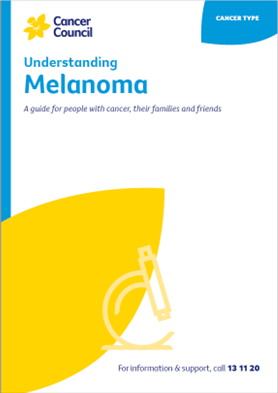Your health care team
You will probably start by seeing your general practitioner (GP).
Learn more about:
Overview
If a GP diagnoses or suspects melanoma, they may remove the spot (excision biopsy) or refer you to another doctor, such as a dermatologist or surgeon, for the biopsy. A pathologist will examine the biopsy specimen to confirm a melanoma diagnosis.
Your doctors can arrange further tests and suggest ways to treat the melanoma. These options may be discussed with other health professionals at what is known as a multidisciplinary team (MDT) meeting. Some people choose to see a doctor at a skin cancer clinic. These are usually staffed by GPs with a specific interest in skin cancer.
Melanoma units
Management and treatment for advanced melanoma is complex.
People with a melanoma thicker than 1 mm or less than 1 mm but with high-risk features, or a melanoma that has spread, may benefit from having treatment in a cancer treatment centre that has doctors who specialise in the treatment of advanced melanoma. These are located at hospitals in major cities around Australia. You will be able to see a range of health professionals who specialise in different aspects of your care.
To find a multidisciplinary melanoma unit near you, check with your doctor or call Cancer Council 13 11 20. Melanoma Patients Australia also provides a list of major melanoma units.
Most people with early melanoma do not need to go to one of these multidisciplinary melanoma units.
Health professionals you may see
| GP | checks skin for suspicious spots, may remove potential skin cancers and refer you to specialists |
| dermatologist | diagnoses, treats and manages skin conditions, including skin cancer |
| general surgeon | performs surgery to remove early melanoma and lymph nodes, and to reconstruct the skin |
| reconstructive (plastic) surgeon | performs surgery that restores, repairs or reconstructs the body’s appearance and function; may also remove lymph nodes |
| surgical oncologist | performs surgery to remove melanoma and conducts more complex surgery on the lymph nodes and other organs; can be a general surgeon or a reconstructive surgeon |
| medical oncologist | treats melanoma with drug therapies such as targeted therapy and immunotherapy |
| radiation oncologist | plans and delivers radiation therapy |
| cancer care coordinator | coordinates care, liaises with MDT and supports you and your family throughout treatment; care may also be coordinated by a clinical nurse consultant (CNC) or clinical nurse specialist (CNS) |
| counsellor, social worker, psychologist | help you manage your emotional response to diagnosis and treatment |
| physiotherapist, occupational therapist | assist with physical and practical issues, including restoring movement and mobility after treatment and recommending aids and equipment |
| palliative care specialist and nurse | work closely with the GP and cancer team to help control symptoms and maintain quality of life |
→ READ MORE: Early melanoma treatment
Podcast: Coping with a Cancer Diagnosis
Listen to more of our podcast for people affected by cancer
More resources
Prof H Peter Soyer, Chair in Dermatology and Director, Dermatology Research Centre, The University of Queensland, Diamantina Institute, and Consultant, Dermatology Department, Princess Alexandra Hospital, QLD; A/Prof Matteo Carlino, Medical Oncologist, Blacktown and Westmead Hospitals, Melanoma Institute Australia and The University of Sydney, NSW; Prof Anne Cust, Deputy Director, The Daffodil Centre, The University of Sydney and Cancer Council NSW, Chair, National Skin Cancer Committee, Cancer Council and faculty member, Melanoma Institute Australia; Prof Diona Damian, Dermatologist, Head of Department, Dermatology, The University of Sydney at Royal Prince Alfred Hospital, NSW, and Melanoma Institute Australia; A/Prof Paul Fishburn, General Practitioner – Skin Cancer, Norwest Skin Cancer Clinic, NSW and The University of Queensland; Claire Kelly, National Support Manager, and Emma Zurawel, Telehealth Nurse, Melanoma Patients Australia; Prof John Kelly, Consultant Dermatologist, Victorian Melanoma Service, The Alfred Melbourne and Monash University, VIC; Liz King, Manager, Skin Cancer Prevention Unit, Cancer Council NSW; Lee-Ann Lovegrove, Consumer; Lynda McKinley, 13 11 20 Consultant, Cancer Council Queensland; Angelica Miller, Melanoma Community Support Nurse, Melanoma Institute Australia incorporating melanomaWA, and Cancer Wellness Centre, WA; Dr Amelia Smit, Research Fellow, Melanoma and Skin Cancer, The Daffodil Centre, The University of Sydney and Cancer Council NSW; Prof Andrew Spillane, Professor of Surgical Oncology, The University of Sydney, The Mater and Royal North Shore Hospitals, NSW, and Melanoma Institute Australia; Kylie Tilley, Consumer; A/Prof Tim Wang, Radiation Oncologist, Crown Princess Mary Cancer Centre, Westmead Hospital, NSW. We also thank the health professionals, consumers and editorial teams who have worked on previous editions of this title.
View the Cancer Council NSW editorial policy.
View all publications or call 13 11 20 for free printed copies.

